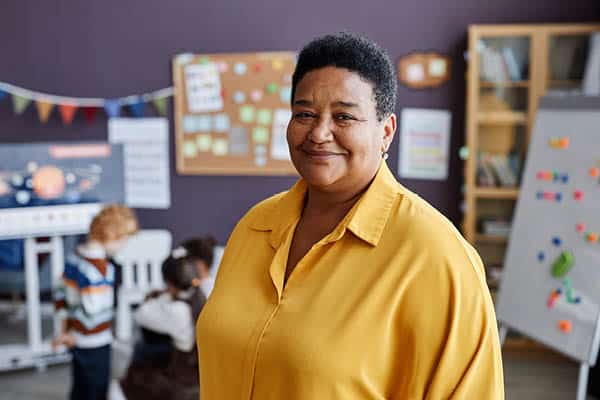Twelve years ago, when I left a career as a lawyer to become a history teacher, my vision of what a “good teacher” looked like was shaped in part by movies which depict teachers who overcome institutional dysfunction to connect with students and inspire them to achieve their potential; writes Catherine Friesen in Chalkbeat New York. Friesen taught Global History in New York City public schools from 2013 to 2023.
Knowing I could not live up to movie models but wanting to do my best —I took my job teaching social studies at a small public high school in the Bronx.
I spent the next decade at that same small school, and my time there reshaped my view of what makes a good teacher. And I learned the extent to which a school’s success depends on collaboration and on an interconnected web of complementary skills of teachers and school staff.
All students need love and a reason to show up. This requires a team capable of providing academic skills and content as well as consistency, emotional support, extracurricular activities, and so much more.
Who is needed on this team? I expected the obvious: general content teachers, teachers who work with English language learners and students with disabilities, counselors, social workers, paraprofessionals, and other support staff.
What is really needed:
1) Teachers who are adept at differentiating instruction for individual learning needs, tutoring small groups, and instructing dozens of students for multiple periods in a single day without a break between classes. Schools need teachers who know the latest scholarship and those who know the latest social media platforms. They need teachers with physical and mental endurance, but they also need teachers who struggle physically or emotionally. There are lessons that cannot be explicitly taught.
2) Teachers and staff who can anticipate and prevent conflicts from happening, those who will jump in to contain a fight, those who can calm a classroom after a conflict raises adrenaline and brings everyone close to an emotional edge, and those who can mediate conflict afterward, bringing healing to the whole community.
3) Teachers with high expectations and teachers with a deep, personal knowledge of the stresses and life experiences that can make it difficult for children to get to school in the morning and live up to their potential.
4) School staff who speak the home languages of the students and teachers who reflect the students’ ethnic, religious, and racial backgrounds.
5) Educators who are willing to reflect on their own assumptions, privileges, and biases, and those who are adept at leading others in that process.
6) Teachers who are not afraid to have hard conversations with students about class, race, gender, and other challenging subjects, and who know how to create productive spaces for them to occur.
7) Staff members with connections to other professionals, the community, and those in the trades. Schools need those willing to organize school-wide events that build a sense of belonging, and those who will organize field trips even when funding or transportation pose challenges.
8) Teachers with naturally loud voices that can reach across a classroom or outdoor space, and they need those who talk softly and force the students to learn to listen more attentively. They need introverts and extroverts.
9) Teachers and staff members who recognize neglect, hunger, and abuse, and those who recognize a student’s hidden genius as a writer, philosopher, artist, poet, or engineer.
10) Teachers who know when to quietly bring a box of tissues, when to text a counselor or consult a social worker, and how to build trust with a student.
11) Teachers who laugh and those who make the students laugh. They need teachers who can laugh at themselves.
This is my love letter and thank you note to my former colleagues. It is also a plea that we do more to acknowledge all of the amazing people who, working together, make a school a good place to learn and grow.
Chalkbeat New York






